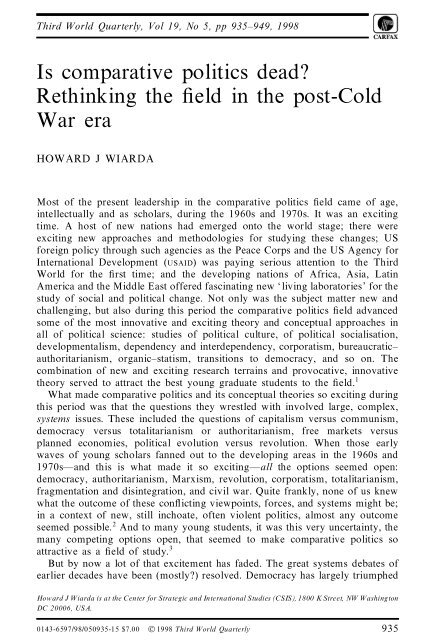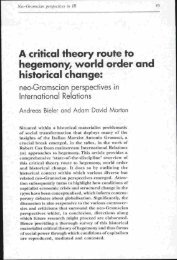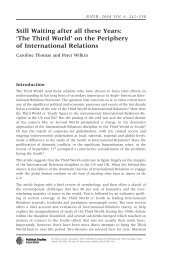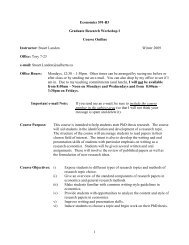Is comparative politics dead? Rethinking the field in the post-Cold ...
Is comparative politics dead? Rethinking the field in the post-Cold ...
Is comparative politics dead? Rethinking the field in the post-Cold ...
You also want an ePaper? Increase the reach of your titles
YUMPU automatically turns print PDFs into web optimized ePapers that Google loves.
HOWARD J WIARDA<strong>in</strong> <strong>the</strong> political sphere; certa<strong>in</strong>ly democracy is <strong>the</strong> only system of government thatenjoys widespread global legitimacy. No regime wants to be called `corporatist’or `Marxist±Len<strong>in</strong>ist’ anymore; both of <strong>the</strong>se system alternatives have beendiscredited. In addition, with <strong>the</strong> collapse of <strong>the</strong> Soviet Union, <strong>the</strong> cold warcon¯ ict between capitalism and communism has largely run its course, and <strong>the</strong>reis only one real superpower left. The success particularly of <strong>the</strong> East Asianeconomies and <strong>the</strong> failures of Cuba, Nicaragua and Eastern Europe demonstrated<strong>the</strong> advantages of private market <strong>in</strong>itiatives over a totally controlled system.Obviously, <strong>the</strong>re is and will cont<strong>in</strong>ue to be debate between advocates of freermarkets and state downsiz<strong>in</strong>g, and those who would preserve statism and a largerwelfare state, but <strong>in</strong>creas<strong>in</strong>gly <strong>the</strong>se <strong>in</strong>volve <strong>the</strong> <strong>politics</strong> of compromise andmoderation (socialist governments <strong>in</strong> <strong>the</strong> UK and Portugal follow<strong>in</strong>g free marketstrategies, right-of-centre governments (under Kohl) <strong>in</strong> Germany and Spa<strong>in</strong>expand<strong>in</strong>g welfarism, virtually everyone else also seek<strong>in</strong>g to comb<strong>in</strong>e free-marketpolicies with strong social programmes) ra<strong>the</strong>r than <strong>the</strong> <strong>politics</strong> of ei<strong>the</strong>r/or.The great systems debates of <strong>the</strong> past are largely over, and with that changehas come a decl<strong>in</strong>e <strong>in</strong> <strong>in</strong>terest <strong>in</strong> <strong>comparative</strong> <strong>politics</strong>. A paradigm shift is underway: whereas <strong>in</strong> <strong>the</strong> 1960s <strong>the</strong> parabola that is <strong>the</strong> rise and fall of <strong>comparative</strong><strong>politics</strong> was on <strong>the</strong> way up; today it is on <strong>the</strong> way down. Graduate students areless <strong>in</strong>terested <strong>in</strong> <strong>the</strong> ® eld because <strong>the</strong> excitement of new research ® elds and new<strong>the</strong>oretical frameworks has died down and, s<strong>in</strong>ce <strong>the</strong> 1970s, <strong>the</strong>re seem to be nogreat conceptual <strong>in</strong>novations or breakthroughs comparable to those of earlierdecades. As such states as Spa<strong>in</strong>, Portugal and Russia have (<strong>in</strong> vary<strong>in</strong>g degree)become democratic, jo<strong>in</strong>ed Europe, and become `normal’ countries, <strong>the</strong>y havealso become more bor<strong>in</strong>g. The `thrill’ <strong>in</strong> <strong>comparative</strong> <strong>politics</strong> is gone; <strong>the</strong>re arestill a host of <strong>in</strong>terest<strong>in</strong>g and important issues to study but <strong>the</strong> great systemsdebates of <strong>the</strong> past appear to be over. There has been a certa<strong>in</strong> `decl<strong>in</strong>e ofideology’ ; 4 <strong>the</strong>re is a certa<strong>in</strong> `end of history’ . 5 So <strong>the</strong> questions we seek to assesshere are how and why <strong>the</strong> ® eld went from excit<strong>in</strong>g to bor<strong>in</strong>g, whe<strong>the</strong>r <strong>comparative</strong><strong>politics</strong> is <strong>in</strong> fact <strong>dead</strong>, and what subjects are still <strong>in</strong>terest<strong>in</strong>g and worthyof study.Comparative <strong>politics</strong>: <strong>the</strong> queen of <strong>the</strong> discipl<strong>in</strong>eIn 1955 Roy Macridis had launched a diatribe aga<strong>in</strong>st traditional <strong>comparative</strong><strong>politics</strong>. 6 He accused <strong>the</strong> ® eld of be<strong>in</strong>g formal±legalistic (study<strong>in</strong>g formal<strong>in</strong>stitutions over non-formal political processes), descriptive ra<strong>the</strong>r than analytic,case study-orientated ra<strong>the</strong>r than genu<strong>in</strong>ely <strong>comparative</strong>, and Eurocentric with itsemphasis on Great Brita<strong>in</strong>, France, Germany and <strong>the</strong> Soviet Union. Macridis’ scritique had a strong effect on <strong>the</strong> `Young Turks’ beg<strong>in</strong>n<strong>in</strong>g to write <strong>in</strong> <strong>the</strong> ® eld<strong>in</strong> those days. In addition, <strong>the</strong> revolution <strong>the</strong>n occurr<strong>in</strong>g <strong>in</strong> political science moregenerallyÐ behaviouralism, <strong>the</strong> study of decision mak<strong>in</strong>g, <strong>the</strong> emphases on<strong>in</strong>formal actors such as political parties and <strong>in</strong>terest groups, research on publicop<strong>in</strong>ion and political processesÐ also had a profound impact on <strong>comparative</strong><strong>politics</strong>. 7Along with <strong>the</strong> Macridis critique, <strong>in</strong> <strong>the</strong> late 1950s and early 1960s came <strong>the</strong>sudden emergence onto <strong>the</strong> world scene of a large number of new nations. The936
IS COMPARATIVE POLITICS DEAD?decolonisation of that period doubled <strong>the</strong> number of <strong>in</strong>dependent countries <strong>in</strong> <strong>the</strong>world and opened up new research opportunities <strong>in</strong> a variety of heretoforeunexplored countries <strong>in</strong> Africa, Asia and <strong>the</strong> Middle East. With <strong>the</strong> pioneer<strong>in</strong>gwork of Gabriel Almond, David Apter, Lucian Pye, Sidney Verba, MyronWe<strong>in</strong>er and <strong>the</strong> Social Science Research Council/Committee on ComparativePolitics, <strong>the</strong> study of `non-Western’ 8 or `develop<strong>in</strong>g’ areas 9 came to <strong>the</strong> fore. Thegrowth of new and excit<strong>in</strong>g <strong>the</strong>ory accompany<strong>in</strong>g <strong>the</strong>se developments made<strong>comparative</strong> <strong>politics</strong> for a time <strong>the</strong> most <strong>in</strong>novative and provocative ® eld with<strong>in</strong>political science. For <strong>the</strong>se reasons <strong>comparative</strong> <strong>politics</strong> dur<strong>in</strong>g this period alsoattracted <strong>the</strong> best and brightest of political science graduate students whoplanned to write doctoral dissertations on <strong>the</strong> develop<strong>in</strong>g areas. `Developmentalism’was <strong>the</strong> dom<strong>in</strong>ant conceptual paradigm at this time, <strong>in</strong>corporat<strong>in</strong>g both <strong>the</strong>effort to ® nd and study development and <strong>the</strong> effort, through such agencies asUSAID, <strong>the</strong> Alliance for Progress, <strong>the</strong> Peace Corps, and o<strong>the</strong>rs, to br<strong>in</strong>g developmentto less-favoured (`develop<strong>in</strong>g’ or `emerg<strong>in</strong>g’ ) countries. It was obvious thatnot only were <strong>the</strong> develop<strong>in</strong>g nations very excit<strong>in</strong>g to study but also that USforeign policy was also <strong>in</strong>creas<strong>in</strong>gly <strong>in</strong>terested <strong>in</strong> <strong>the</strong>m and was seek<strong>in</strong>g to ® nda non-communist <strong>the</strong>ory of development to counter <strong>the</strong> appeals of Marxism±Len<strong>in</strong>ism. At <strong>the</strong> time (pre-Vietnam), most scholars <strong>in</strong>terested <strong>in</strong> developmentsaw no contradiction between <strong>the</strong>ir academic <strong>in</strong>terest <strong>in</strong> development and <strong>the</strong>serv<strong>in</strong>g of US foreign policy goals, presumably <strong>in</strong>corporat<strong>in</strong>g <strong>the</strong> same objectives.10Meanwhile, by <strong>the</strong> mid-to-late 1960s, many of <strong>the</strong> younger scholars tra<strong>in</strong>ed <strong>in</strong>development returned from <strong>the</strong> ® eld with <strong>the</strong>ir dissertations under <strong>the</strong>ir arms,hav<strong>in</strong>g found precious little `development’ Ð function<strong>in</strong>g political parties or partysystems, <strong>in</strong>dependent trade unions, function<strong>in</strong>g legislature, and so on. Thesentiment eventually grew that it was not just `<strong>the</strong>ir countries’ that were`dysfunctional’ for lack<strong>in</strong>g <strong>the</strong>se assumed accoutrements of development, butthat <strong>the</strong> <strong>the</strong>ory of development was itself ¯ awed and based on misplacedassumptions. 11 The critiques of <strong>the</strong> developmentalist approach and logic grewlouder; at <strong>the</strong> same time <strong>the</strong> 1965 US <strong>in</strong>tervention <strong>in</strong> <strong>the</strong> Dom<strong>in</strong>ican Republic,<strong>the</strong> escalation <strong>in</strong> Vietnam, <strong>the</strong> assass<strong>in</strong>ations of Robert F Kennedy and Mart<strong>in</strong>Lu<strong>the</strong>r K<strong>in</strong>g, and <strong>the</strong>n <strong>the</strong> presidency of Richard Nixon and Watergate led manyscholars to become thoroughly disillusioned with both <strong>the</strong> <strong>the</strong>ory of developmentand <strong>the</strong> practice of US <strong>politics</strong> and policy on which so much of <strong>the</strong> developmentalistmodel had been based. The critiques of developmentalism were eventuallyso powerful and widespread that <strong>the</strong> <strong>the</strong>ory went <strong>in</strong>to eclipse and was largelyignored <strong>in</strong> <strong>comparative</strong> <strong>politics</strong> <strong>in</strong> <strong>the</strong> 1970s and 1980s.Two ma<strong>in</strong> alternatives to developmentalism arose <strong>in</strong> <strong>the</strong> early 1970s andga<strong>in</strong>ed widespread attention: dependency <strong>the</strong>ory and corporatism. Both <strong>the</strong>sealternative approaches were strongly critical of developmentalism; both arose asconscious alternatives to it. Dependency <strong>the</strong>ory, 12 ma<strong>in</strong>ly Marxian <strong>in</strong> orig<strong>in</strong>,criticised <strong>the</strong> dom<strong>in</strong>ant developmentalism for ignor<strong>in</strong>g domestic class factors aswell as <strong>in</strong>ternational market and power factors <strong>in</strong> development, and wasparticularly critical of US foreign policy and mult<strong>in</strong>ational corporations. Itsuggested, contrary to <strong>the</strong> earlier development <strong>the</strong>ory, that <strong>the</strong> development of<strong>the</strong> already-<strong>in</strong>dustrialised nations and that of <strong>the</strong> develop<strong>in</strong>g ones would not go937
HOWARD J WIARDAtoge<strong>the</strong>r hand-<strong>in</strong>-hand; <strong>in</strong>stead, dependency <strong>the</strong>ory argued that <strong>the</strong> developmentof <strong>the</strong> West had come on <strong>the</strong> shoulders and at <strong>the</strong> cost of <strong>the</strong> non-West. Thecorporatist approach criticised developmentalism for its Euro-American ethnocentrismand <strong>in</strong>dicated that <strong>the</strong>re were alternative organic, corporatist, oftenauthoritarian ways to organise <strong>the</strong> state and state±society relations besides <strong>the</strong>dom<strong>in</strong>ant liberal±pluralism that undergirded developmentalism. 13 Although <strong>the</strong>dependency and corporatist `schools’ often feuded with<strong>in</strong> and between <strong>the</strong>mselves,between <strong>the</strong>m <strong>the</strong>y largely squeezed and criticised <strong>the</strong> developmentalistapproach out of <strong>the</strong> picture.Dur<strong>in</strong>g <strong>the</strong> later 1970s and on <strong>in</strong>to <strong>the</strong> 1980s, still re¯ ect<strong>in</strong>g <strong>the</strong> backlashaga<strong>in</strong>st developmentalism, a number of o<strong>the</strong>r <strong>the</strong>ories and approaches emerged. 14These <strong>in</strong>cluded bureaucratic±authoritarianism, 15 organic±statism, 16 and <strong>in</strong>digenousconcepts of change. 17 Later, <strong>in</strong> <strong>the</strong> 1980s, new subject matters, if not newapproaches, came similarly to <strong>the</strong> fore: transitions to democracy, <strong>the</strong> <strong>politics</strong> ofstructural adjustment, neoliberalism and privatisation. Some of <strong>the</strong> early scholarsof development resented <strong>the</strong>se new approaches as underm<strong>in</strong><strong>in</strong>g and break<strong>in</strong>g <strong>the</strong>unity of <strong>the</strong> ® eld (as well as <strong>the</strong>ir own monopoly of it), but o<strong>the</strong>rs saw <strong>the</strong>m asadd<strong>in</strong>g healthy diversity, provid<strong>in</strong>g an alternative variety of approaches andenlighten<strong>in</strong>g subject areas not covered by <strong>the</strong> earlier developmentalist perspective.18The debate and excitement with<strong>in</strong> <strong>the</strong> ® eld dur<strong>in</strong>g this period of <strong>the</strong> 1960sthrough <strong>the</strong> early-to-mid-1980s re¯ ected <strong>the</strong> large issues with which <strong>comparative</strong><strong>politics</strong> had to wrestle. It bears repeat<strong>in</strong>g that <strong>the</strong>se were grand systems issues.The ongo<strong>in</strong>g debate between advocates of <strong>the</strong> developmentalist, dependency,corporatist, and o<strong>the</strong>r schools mentioned was not just an academic debate overproverbial small stakes; ra<strong>the</strong>r, it was a vigorous discussion about <strong>the</strong> futuredirection of develop<strong>in</strong>g and transitional nations <strong>the</strong>mselves. Would <strong>the</strong>y becapitalist or socialist; would <strong>the</strong>y have liberal±democratic, corporatist±authoritarian,or communist±totalitarian political systems; would <strong>the</strong>ir path of developmentbe by revolution, civil war, or gradual evolutionary change? Would <strong>the</strong>ybe viable as societies and nation-states or would <strong>the</strong>y break down <strong>in</strong>to chaos,ungovernability, and civil war; and what was <strong>the</strong> best political and economicsystem for achiev<strong>in</strong>g viability and avoid<strong>in</strong>g breakdown?Complicat<strong>in</strong>g all <strong>the</strong>se already large and complex questions was <strong>the</strong> sometimesovert and sometimes covert foreign-policy issue: with which side <strong>in</strong> <strong>the</strong><strong>Cold</strong> War would <strong>the</strong> develop<strong>in</strong>g nations be aligned and which model of all thosediscussed above would best assure <strong>the</strong> <strong>Cold</strong> War goals set by <strong>the</strong> superpowers?These were big issues; <strong>the</strong> stakes <strong>in</strong>volved were enormous. The importance of<strong>the</strong> debate as well as <strong>the</strong> <strong>in</strong>tellectual excitement created by <strong>the</strong> complex andoften con¯ ict<strong>in</strong>g <strong>the</strong>ories <strong>in</strong>volved made <strong>comparative</strong> <strong>politics</strong> dur<strong>in</strong>g all thisperiod <strong>the</strong> most excit<strong>in</strong>g ® eld <strong>in</strong> <strong>the</strong> political science discipl<strong>in</strong>e and developmentstudies <strong>the</strong> most <strong>in</strong>novative ® eld <strong>in</strong> <strong>the</strong> social sciences.The eclipse of systems issuesAs <strong>the</strong> 1980s dawned, <strong>the</strong> world rema<strong>in</strong>ed a tumultuous and uncerta<strong>in</strong> place. The® rst of <strong>the</strong> `third-wave’ transitions to democracy had begun but <strong>the</strong>ir outcome938
IS COMPARATIVE POLITICS DEAD?still rema<strong>in</strong>ed fragile and uncerta<strong>in</strong>. 19 The <strong>Cold</strong> War rema<strong>in</strong>ed hot <strong>in</strong> suchfar-¯ ung regions of con¯ ict as Sou<strong>the</strong>rn Africa, Afghanistan, Central America,<strong>the</strong> Horn of Africa, and <strong>the</strong> Middle East; and at <strong>the</strong> time <strong>the</strong> issue of which of<strong>the</strong> superpowers would emerge victorious was by no means certa<strong>in</strong>. Marxism <strong>in</strong>its various forms, corporatism, authoritarianism, revolution, and democracy allseemed to be possible outcomes <strong>in</strong> many so-called develop<strong>in</strong>g nations. TheAsian `tigers’ (Hong Kong, S<strong>in</strong>gapore, South Korea and Taiwan) had begun toshow impressive economic growth but <strong>the</strong> term Newly Industrialised Countries(NICs) had not yet been co<strong>in</strong>ed and no one quite expected <strong>the</strong> Asian NICs toblossom <strong>in</strong>to global models.But dur<strong>in</strong>g <strong>the</strong> course of <strong>the</strong> 1980s and on <strong>in</strong>to <strong>the</strong> 1990s, many of <strong>the</strong>seearlier con¯ icts were resolved. More than that, after some 30 years of experimentationand experience (as dist<strong>in</strong>ct from <strong>the</strong> earlier <strong>the</strong>ory), it became quitepossible to say what works <strong>in</strong> development and what doesn’ t. 20 In addition, <strong>the</strong>older ideological, partisan and class passions began to fade <strong>in</strong> some countries orwere ameliorated somewhat. Many countries whose economic, social and politicalsystems had seem<strong>in</strong>gly been `up for grabs’ settled down to become morenormal, even `bor<strong>in</strong>g’ countries; democracy <strong>in</strong> one form or ano<strong>the</strong>r was largely<strong>in</strong>stitutionalised. While it is not quite certa<strong>in</strong> that history has `ended’ <strong>in</strong> somede® nitive way, it is clear that <strong>the</strong> older ideological con¯ icts have decl<strong>in</strong>ed andthat, along with <strong>the</strong> end of <strong>the</strong> <strong>Cold</strong> War, <strong>the</strong> great systems debates of earlierdecades are largely over. Democracy, consumerism and neoliberalism or amixed form of capitalism and social welfare appear to have emerged triumphant.All of <strong>the</strong>se real-world changes also carry immense implications for <strong>the</strong> ® eldof <strong>comparative</strong> <strong>politics</strong>. Our purpose here is not to offer a complete or de® nitiveanalysis of all <strong>the</strong>se transformations (impossible <strong>in</strong> a few pages), but to providea region-by-region survey of some of <strong>the</strong> major changes <strong>in</strong> each area, to suggesthow <strong>the</strong>se have affected <strong>the</strong> great systems debates of earlier years, and <strong>the</strong>n toexplore <strong>the</strong> broad implications of <strong>the</strong>se changes for <strong>comparative</strong> <strong>politics</strong>. Amore detailed, systematic and thorough explanation must be reserved for a latertime. At this stage our hope is to offer a provocation, a set of researchsuggestions, and a number of hypo<strong>the</strong>ses <strong>in</strong> narrative form, not a full and ® naltreatment. 21The ® rst countries to experience <strong>the</strong> `third-wave’ transitions to democracy <strong>in</strong><strong>the</strong> mid-1970s were <strong>the</strong> Sou<strong>the</strong>rn European countries of Greece, Portugal andSpa<strong>in</strong>. All three had long been perceived as be<strong>in</strong>g on <strong>the</strong> periphery of Europe,dependent on <strong>the</strong> centre <strong>in</strong> economic and political terms, and backward andunderdeveloped socially, economically and politically. At <strong>the</strong> time of <strong>the</strong>irtransitions <strong>in</strong> 1974±75, all options seemed to be open: cont<strong>in</strong>ued authoritarianismand corporatism, democracy, Marxian revolution, breakdown and fragmentation,even <strong>the</strong> possibility of civil war. These were excit<strong>in</strong>g, large-scalesystems issues; one suspects it was <strong>the</strong> systems-wide magnitude of <strong>the</strong> issues<strong>in</strong>volved that attracted so many scholars to Sou<strong>the</strong>rn Europe <strong>in</strong> <strong>the</strong> 1970s.But s<strong>in</strong>ce that time, Greece, Portugal and Spa<strong>in</strong> have settled down, become`normal’ countries. They are so normal as to be almost bor<strong>in</strong>g politically.Democracy has triumphed, elections are held regularly, a more-or-less stable939
HOWARD J WIARDAparty system has emerged, and <strong>in</strong> all three countries <strong>the</strong>re have been at least twoelections <strong>in</strong> which power has passed peacefully to <strong>the</strong> oppositionÐ usuallythought of as a key <strong>in</strong>dicator of <strong>the</strong> consolidation of democracy.All three countries are now members of <strong>the</strong> EUC and NATO. Per capita <strong>in</strong>comehas risen to roughly 70% of <strong>the</strong> European average and a stable middle class hasemerged. Ideological passions have cooled, depoliticisation has taken place andconsumerism has triumphed. Socialist governments carry out neoliberal economicpolicies while right-of-centre governments expand social welfare. Democracy’s triumph has been so de® nitive and enjoys such high legitimacy that aleft-w<strong>in</strong>g revolution or a right-w<strong>in</strong>g coup are unth<strong>in</strong>kable. All <strong>the</strong> great systemsissues have been resolved; <strong>politics</strong> revolves around `more or less’ (a little lesssocial welfare, a little more privatisation, or vice versa) ra<strong>the</strong>r than <strong>the</strong> make-orbreakissues of <strong>the</strong> past. As elsewhere <strong>in</strong> Europe, <strong>the</strong>re is widespread consensuson democracy, employment, stability, welfare, markets, cont<strong>in</strong>ued growth, consumerismand someth<strong>in</strong>g ak<strong>in</strong> to a guaranteed <strong>in</strong>come. Arguments still occuraround <strong>the</strong> marg<strong>in</strong>s of <strong>the</strong>se issues but not on <strong>the</strong> basics. 22Some parallel developments have occurred <strong>in</strong> Asia. First, <strong>the</strong> authoritarianpolitical systems of earlier decades <strong>in</strong> South Korea, Taiwan and S<strong>in</strong>gapore havebecome more open, democratic, and pluralist. Second and relatedly, <strong>the</strong> authoritarian,state corporatism of <strong>the</strong> past has become more participatory and sociallyjust (`societal corporatism’ ). Third, <strong>the</strong> economies of <strong>the</strong> area boomed: <strong>the</strong> fourAsian Tigers (Hong Kong, S<strong>in</strong>gapore, South Korea and Taiwan) became NICsand began to challenge <strong>the</strong> already <strong>in</strong>dustrialised nations on several economicfronts. Fourth, this economic boom spread to o<strong>the</strong>r, previously less-developedcountries (Indonesia, Malaysia, The Philipp<strong>in</strong>es, Laos, Thailand); while, ® fth,even such communist countries as Ch<strong>in</strong>a and Vietnam have seen <strong>the</strong> bene® ts ofopen<strong>in</strong>g <strong>the</strong>ir markets even as <strong>the</strong>y still utilise <strong>the</strong> political controls of acommand regime. Sixth, India has now been a political democracy for 50 years;recently, and look<strong>in</strong>g at <strong>the</strong> example of its Asian neighbours, it has taken stepsto reform and free up its economy as well. Thus, <strong>in</strong> both <strong>the</strong> political and <strong>the</strong>economic realms, <strong>the</strong> future path <strong>in</strong> Asia, despite recent and probably temporarydownturns, seems clear: greater pluralism and democracy coupled with acomb<strong>in</strong>ed statist±bureaucratic and more open-market system. 23A personal anecdote may help illustrate <strong>the</strong> po<strong>in</strong>t. In 1987 <strong>the</strong> author andSoviet Union specialist Jerry Hough were part of an academic delegation visit<strong>in</strong>gS<strong>in</strong>gapore. In a variation on <strong>the</strong> `mouse that roared’ <strong>the</strong>me, Hough madefront-page headl<strong>in</strong>es <strong>in</strong> all <strong>the</strong> S<strong>in</strong>gapore newspapers by claim<strong>in</strong>gÐ with only alittle hyperboleÐ that it was `little’ S<strong>in</strong>gapore that had won <strong>the</strong> <strong>Cold</strong> War! Heargued that it was <strong>the</strong> dynamism and success of <strong>the</strong> S<strong>in</strong>gapore economy (and thatof <strong>the</strong> o<strong>the</strong>r Asian Tigers) that had shown to <strong>the</strong> Soviets, o<strong>the</strong>r develop<strong>in</strong>gcountries, and <strong>the</strong> world that market capitalism was far more productive andsuperior to Marxist±Len<strong>in</strong>ist economies. One can see why this assessment wasso well received by <strong>the</strong> S<strong>in</strong>gapore press: city-state-sized S<strong>in</strong>gapore had becomea model for <strong>the</strong> world.Lat<strong>in</strong> America’ s political systems are more fragile than those of Sou<strong>the</strong>rnEurope and its economies less developed, but many of <strong>the</strong> same trends present<strong>in</strong> Spa<strong>in</strong>, Portugal, Greece and even Asia are also present <strong>in</strong> Lat<strong>in</strong> America.940
IS COMPARATIVE POLITICS DEAD?Indeed, <strong>the</strong> two Iberian countries, especially Spa<strong>in</strong>, like to present <strong>the</strong>mselves asmodels for Lat<strong>in</strong> America. Here are a few, perhaps surpris<strong>in</strong>g, statistics forcomparison: <strong>in</strong> 1960 Lat<strong>in</strong> America was 70% rural (and agrarian reform was amajor issue); now it is 70% urban. In 1960 Lat<strong>in</strong> America was 70% illiterate;now it is 70% literate. In 1960 Lat<strong>in</strong> America’ s per capita <strong>in</strong>come was <strong>in</strong> <strong>the</strong>$300±$400 range; now it is quadruple that, and most countries have reachedmiddle-<strong>in</strong>come levels. Lat<strong>in</strong> America is currently one of <strong>the</strong> most dynamic areaseconomically <strong>in</strong> <strong>the</strong> world. In 1977 (at <strong>the</strong> height of <strong>the</strong> wave of bureaucratic±authoritarianism) 14 of <strong>the</strong> 20 Lat<strong>in</strong> American countries were under military ruleand <strong>in</strong> three o<strong>the</strong>r countries <strong>the</strong> military was so close to <strong>the</strong> surface of power asto make <strong>the</strong> l<strong>in</strong>e between civil and military all but <strong>in</strong>visible. In 1997, <strong>in</strong> contrast,19 of <strong>the</strong> 20 countries (all except Cuba) could be said to be democratic or enroute to democracy. 24Polls show that 80%, 85%, or even 90% (depend<strong>in</strong>g on <strong>the</strong> country) of <strong>the</strong>population support liberal, democratic, representative rule. Almost no one (2%,3%, 5%, depend<strong>in</strong>g on <strong>the</strong> country) wants Marxism±Len<strong>in</strong>ism or a return toauthoritarianism and corporatism anymore. While <strong>the</strong> legitimacy of democracyis thus high, <strong>the</strong> precise mean<strong>in</strong>g of democracy (`controlled’ , `tutelary’ , `delegative’, `Rousseauian’ Ð democracy with adjectives) is not so clear-cut. Moreover,<strong>the</strong> public support for what we th<strong>in</strong>k of as democracy’ s essential pluralistunderp<strong>in</strong>n<strong>in</strong>gsÐ political parties, trade unions, etcÐ is often low, <strong>in</strong> <strong>the</strong> range of10%, 15%, or 20%. Electoral democracy has clearly triumphed <strong>in</strong> Lat<strong>in</strong> Americabut liberal democracy has not yet been ® rmly entrenched. 25 Nor are Lat<strong>in</strong>Americans fully conv<strong>in</strong>ced of <strong>the</strong> ef® cacy of a neoliberal economic orderÐ although<strong>the</strong>y lack a viable alternative model.As was <strong>the</strong> case with Sou<strong>the</strong>rn Europe, a large number of young scholars wasattracted to Lat<strong>in</strong> America <strong>in</strong> <strong>the</strong> past because of <strong>the</strong> excitement and romance of<strong>the</strong> major changes tak<strong>in</strong>g place <strong>the</strong>re and because it offered a marvelouslaboratory of social and political transformation. Lat<strong>in</strong> America was a systemsarea par excellence. Democracy, revolutions, coups, guerrilla strugglesÐ all <strong>the</strong>options seemed possible. But with democracy now triumphant, most guerrillamovements su<strong>in</strong>g for peace or reconstitut<strong>in</strong>g <strong>the</strong>mselves as political parties andjo<strong>in</strong><strong>in</strong>g <strong>the</strong> electoral political process, and coups d’ eÂtat a th<strong>in</strong>g of <strong>the</strong> past <strong>in</strong>most countries, <strong>the</strong> great systems con¯ icts of previous decades have died down.Lat<strong>in</strong> America, too, like Sou<strong>the</strong>rn Europe and Asia, is now more prosperous,more middle class, less ideological, more consumerist, more af¯ uent, thusprovid<strong>in</strong>g a stronger socioeconomic base for democracy.While Lat<strong>in</strong> America is presently strongly democratic, its democracy is not so® rmly established or <strong>in</strong>stitutionalised as that of Sou<strong>the</strong>rn Europe. The precisemean<strong>in</strong>g of democracy (patronage <strong>in</strong> Brazil, welfarism <strong>in</strong> Uruguay, often organicand corporatist elsewhere) is still not entirely clear, and <strong>the</strong> <strong>in</strong>stitutions ofdemocracy are often weak. The large, well endowed South American countrieshave <strong>in</strong> general stronger economies and better <strong>in</strong>stitutionalised political systemsthan <strong>the</strong> weaker countries of Central America; hence <strong>the</strong>re is still <strong>the</strong> possibilityof a coup d’ eÂtat <strong>in</strong> some of <strong>the</strong> latter countries, although probably not a wholewave of authoritarian takeovers as occurred <strong>in</strong> <strong>the</strong> 1960s and 1970s. In addition,<strong>the</strong> Lat<strong>in</strong> American political process is still more anomic, chaotic and con¯ ict-941
HOWARD J WIARDAprone than <strong>in</strong> <strong>the</strong> more developed countries, with street demonstrations, strikes,riots, structured violence, property takeovers, etc, that have <strong>the</strong> potential toproduce more open-ended <strong>politics</strong>. Equity and social justice issues are stillcritical, class and racial divisions rema<strong>in</strong> sharp, and <strong>the</strong> neoliberal agenda hasnot yet produced <strong>the</strong> economic ga<strong>in</strong>s expected. 26 However, with both Marxism±Len<strong>in</strong>ism and traditional statism/mercantilism discredited, <strong>the</strong>re is presently noreal alternative to <strong>the</strong> neoliberal model. Political debate has largely concentratedon <strong>the</strong> pace and extent of <strong>the</strong>se changes, not on <strong>the</strong> need for reform itself. Onceaga<strong>in</strong> it is <strong>the</strong> <strong>politics</strong> of `more or less’ ra<strong>the</strong>r than that of ei<strong>the</strong>r or that isemerg<strong>in</strong>g triumphantÐ less dramatic than Lat<strong>in</strong> American <strong>politics</strong> <strong>in</strong> <strong>the</strong> past butprobably more hopeful, too.Russia and Eastern Europe are presently go<strong>in</strong>g through many of <strong>the</strong> samesystems changes as did Sou<strong>the</strong>rn Europe, Asia and Lat<strong>in</strong> America <strong>in</strong> previousdecades. Indeed, one is struck by <strong>the</strong> remarkable parallels between <strong>the</strong>se fourareas. To use a now almost forgotten phrase from W W Rostow, 27 it may be thatnot only was Marxism±Len<strong>in</strong>ism a `disease of <strong>the</strong> transition’ (to modernity) butalso that authoritarian±corporatism was similarly a `disease’ of <strong>the</strong> same transition.That is to say that both Marxism±Len<strong>in</strong>ism on <strong>the</strong> Left and authoritariancorporatism on <strong>the</strong> Right were products of a certa<strong>in</strong> vulnerable stage of <strong>the</strong>transition from tradition to modernity, a stage and time period where systembreakdown and extremism of both Left and Right were possible. We have longknown that communism and fascism were not only often bitter enemies but alsoexhibited numerous parallels, 28 and now we know ano<strong>the</strong>r reason why: <strong>the</strong>y wereproducts of <strong>the</strong> same time period and of many of <strong>the</strong> same wrench<strong>in</strong>g, divisive,potentially morbi® c social and political forces. But now, after a long <strong>in</strong>terregnum(40 years of authoritarian corporatism <strong>in</strong> Spa<strong>in</strong> and Portugal, 70 years ofMarxism±Len<strong>in</strong>ism <strong>in</strong> <strong>the</strong> USSR), those conditions have dramatically changedand so have <strong>the</strong> two k<strong>in</strong>ds of countries discussed. 29Let us make some prelim<strong>in</strong>ary dist<strong>in</strong>ctions, which are well worth fur<strong>the</strong>r<strong>comparative</strong> <strong>politics</strong> research. 30 First, because of geography, proximity, history,culture and sociologyÐ to say noth<strong>in</strong>g of <strong>the</strong> fact that its Marxism±Len<strong>in</strong>ism wasimposed by <strong>in</strong>vad<strong>in</strong>g and occupy<strong>in</strong>g Soviet armiesÐ Eastern Europe is <strong>in</strong> generalcurrently closer to <strong>the</strong> Western model politically (democracy) and economically(mixed market economies) than is Russia. Second, with<strong>in</strong> Eastern Europe <strong>the</strong>reare also major differences: Poland, Hungary, <strong>the</strong> Czech Republic, Slovakia, <strong>the</strong>Baltic states and Slovenia are closer to <strong>the</strong> West politically and economically(democracy and a free market/mixed economy) than are Romania, Bulgaria,Croatia, Bosnia and Serbia. Poland, Hungary and <strong>the</strong> Czech Republic are <strong>in</strong> <strong>the</strong>process of be<strong>in</strong>g admitted to NATO; negotiations with some of <strong>the</strong> o<strong>the</strong>r countriesover NATO admission are go<strong>in</strong>g forward; and it seems clear that <strong>in</strong> one form orano<strong>the</strong>r much of Eastern (now Central) Europe will be <strong>in</strong>tegrated economically,ma<strong>in</strong>ly through German and Austrian <strong>in</strong>vestment, <strong>in</strong>to Europe as well. Exceptperhaps for Bosnia, <strong>the</strong> great systems debate <strong>in</strong> Eastern Europe of recent yearsover which direction to pursue seems to be ma<strong>in</strong>ly over as well; democracy anda mixed economy are becom<strong>in</strong>g triumphant here as <strong>in</strong> o<strong>the</strong>r areas surveyedÐeven though numerous structural reforms are still required <strong>in</strong> <strong>the</strong>se countries.Russia and some members of <strong>the</strong> Commonwealth of Independent States942
IS COMPARATIVE POLITICS DEAD?constitute a more dif® cult case. 31 On <strong>the</strong> one hand, Russia <strong>in</strong> <strong>the</strong> past eight yearshas made remarkable strides towards democracy and a more open market system.On <strong>the</strong> o<strong>the</strong>r, Russia’ s democracy rema<strong>in</strong>s weakly <strong>in</strong>stitutionalised, its democraticleadership is uncerta<strong>in</strong>, and <strong>the</strong> economy is often run <strong>in</strong> a corrupt and patronagebasedway. At <strong>the</strong> same time, nationalistic Slavophile forces are assertive and<strong>the</strong>re exists at least <strong>the</strong> possibility of a communist return to power or, alternatively,a military coup. These system possibilities help make Russia a fasc<strong>in</strong>at<strong>in</strong>gcountry to study and have lured a new generation of scholars to <strong>the</strong> area. Butwhile <strong>the</strong>se alternative systems models are still possibilities, a more likelyoutcome is a cont<strong>in</strong>uation of <strong>the</strong> status quo: an uncerta<strong>in</strong> and sometimes wobblydemocracy comb<strong>in</strong>ed with a form of entrepreneurial capitalism. In this senseRussia is rem<strong>in</strong>iscent of Greece, Portugal and Spa<strong>in</strong> <strong>in</strong> <strong>the</strong> late 1970s: on <strong>the</strong> wayto democracy and freer markets but with <strong>the</strong> changes not yet <strong>in</strong>stitutionalised orconsolidated.With regard to <strong>the</strong> Commonwealth of Independent States, some fur<strong>the</strong>rdist<strong>in</strong>ctions need to be made. Because of geography, culture, level of developmentand proximity to Europe, it seems likely that <strong>the</strong> Baltic states, Georgia, <strong>the</strong>Ukra<strong>in</strong>e, and (less certa<strong>in</strong>ly) BelorussiaÐ to say noth<strong>in</strong>g of Russia itselfÐ willfollow, <strong>in</strong> one form or ano<strong>the</strong>r, <strong>the</strong> European polity (democracy) and economy(open markets, mixed economy) model. On <strong>the</strong> o<strong>the</strong>r hand, such areas asChechnya, Azerbaijan, Kazakhstan, Uzbekistan, Tadzhikistan, Kyrgyzstan andTurkmenistan may come closer to <strong>the</strong> earlier East Asian model of a form ofauthoritarianism politically and a more statist model economically. In <strong>the</strong>se areasof <strong>the</strong> former Soviet Union, <strong>the</strong> systems debate of <strong>the</strong> past would seem to be stilllively. 32The two o<strong>the</strong>r areas of <strong>the</strong> world where <strong>the</strong> question of system is, for <strong>the</strong> mostpart, still <strong>in</strong>tensely debated and often fought over, are sub-Saharan Africa and <strong>the</strong><strong>Is</strong>lamic world. While some countries of sub-Saharan Africa are stabilis<strong>in</strong>g anddemonstrat<strong>in</strong>g economic and political progress, o<strong>the</strong>r countries rema<strong>in</strong> unstable,torn apart by con¯ ict, revolution, civil war, or coup d’ eÂtat. 33 While Marxism has<strong>in</strong> many countries been discredited, authoritarianismÐ often disguised by <strong>the</strong>rhetoric and appearance of democratic electionsÐ is still prevalent. In addition,<strong>the</strong> idea of an <strong>in</strong>digenous, home-grown model of developmentÐ whatever thatmight mean and with all its problems of implementation 34 Ð is still attractive <strong>in</strong><strong>the</strong> context of sub-Sahara Africa. Although progress towards democracy and freemarkets seems often glacial, change is occurr<strong>in</strong>g <strong>in</strong> <strong>the</strong> form of greater decentralisationand privatisation that may lead to systems change and improvements <strong>in</strong><strong>the</strong> future. The recent changes <strong>in</strong> Africa as well as <strong>the</strong> systems options still openhave attracted both renewed policy attention and scholarly <strong>in</strong>terest to <strong>the</strong> area.The <strong>Is</strong>lamic world has similarly been slow <strong>in</strong> mov<strong>in</strong>g toward ei<strong>the</strong>r politicalor economic reform. Or, if it has moved towards democracy and elections(Algeria), it has sometimes had to cancel <strong>the</strong> democratic open<strong>in</strong>g because of <strong>the</strong>threat or actuality of victory by <strong>Is</strong>lamic fundamentalists. The result is that, of all<strong>the</strong> world’ s geographic or culture areas, <strong>the</strong> <strong>Is</strong>lamic world has cont<strong>in</strong>ued to lagdepress<strong>in</strong>gly beh<strong>in</strong>d <strong>in</strong> both <strong>the</strong> economic and political spheres. 35 Economically,many of <strong>the</strong> <strong>Is</strong>lamic countries are still dom<strong>in</strong>ated by elites, oligarchies and royalfamilies who monopolise most of <strong>the</strong> wealth for <strong>the</strong>mselves; elsewhere a943
HOWARD J WIARDAbureaucratic±statist and often highly politicised or militarised model rema<strong>in</strong>s <strong>in</strong>place that has <strong>in</strong>hibited economic growth. Politically, much of <strong>the</strong> <strong>Is</strong>lamic worldis still dom<strong>in</strong>ated by authoritarianism and a top-down model of political control;only <strong>in</strong> a handful of countries (Jordan, Iran, Kuwait) have even <strong>the</strong> earliest andquite limited forms of political open<strong>in</strong>g taken place. In addition, <strong>the</strong>re are strong,ongo<strong>in</strong>g efforts to fashion a dist<strong>in</strong>ctly <strong>Is</strong>lamic model of development as analternative to <strong>the</strong> Western oneÐ one that, as <strong>in</strong> Africa, is beset by dif® culties. 36It is perhaps no co<strong>in</strong>cidence that <strong>the</strong> <strong>Is</strong>lamic world constitutes one of <strong>the</strong> ma<strong>in</strong>cases <strong>in</strong> Samuel P Hunt<strong>in</strong>gton’ s recent writ<strong>in</strong>g on `<strong>the</strong> clash of civilisations’ . 37Hence, <strong>in</strong> virtually all global areas (sub-Saharan Africa and <strong>the</strong> <strong>Is</strong>lamic worldare <strong>the</strong> major exceptions), we have seen <strong>in</strong> recent years a signi® cant gravitationtowards more open political and economic systems. The ma<strong>in</strong> alternatives ofMarxism±Len<strong>in</strong>ism and corporatism±authoritarianism have been uprooted andlargely discredited; only democracy and free markets (usually comb<strong>in</strong>ed withwelfarism and some form of statism) now enjoy widespread legitimacy. It maybe democracy or free markets with adjectives (controlled democracy, tutelarydemocracy, delegative democracy, limited democracy), but it is democracynone<strong>the</strong>less; even <strong>the</strong> adjectives seem to re<strong>in</strong>force that it is only democracy thathas legitimacy. The precise mean<strong>in</strong>gs of democracy and free markets may varysomewhat but <strong>in</strong>creas<strong>in</strong>gly, <strong>in</strong> grand systems terms, <strong>the</strong> <strong>politics</strong> of compromiseand pragmatism has replaced <strong>the</strong> <strong>politics</strong> of ideological ei<strong>the</strong>r or. All of thissuggests, with immense implications for <strong>comparative</strong> <strong>politics</strong>, that <strong>the</strong> greatsystems debates of <strong>the</strong> past are largely over. And <strong>the</strong> ® eld is somewhat lessexcit<strong>in</strong>g because of <strong>the</strong>se transformations. After all, what is <strong>the</strong>re to compare ifso many goals, policies and <strong>in</strong>stitutions are so similar?Future research terra<strong>in</strong>sIt is <strong>the</strong> contention of this paper that, with <strong>the</strong> eclipse if not disappearance of <strong>the</strong>great systems debates of <strong>the</strong> past, <strong>comparative</strong> <strong>politics</strong> as a ® eld has become bothless <strong>in</strong>novative and less entic<strong>in</strong>g. What attracted many persons to <strong>the</strong> ® eld <strong>in</strong> <strong>the</strong>past was <strong>the</strong> sense that all options were open, all system possibilities debatable.But now democracy has overwhelm<strong>in</strong>gly triumphed <strong>in</strong> <strong>the</strong> political realm and, toa somewhat lesser extent, neoliberalism (and its various modi® ed forms) <strong>in</strong> <strong>the</strong>economic. In terms of <strong>the</strong> personal belief systems of scholars of <strong>comparative</strong><strong>politics</strong>, this outcome may or may not be laudable; but <strong>the</strong>re is no doubt that ithas also served to dim<strong>in</strong>ish <strong>in</strong>terest <strong>in</strong> <strong>the</strong> ® eld. As more and more countrieshave become `normal’ countriesÐ that is, conform<strong>in</strong>g to <strong>the</strong>se political andeconomic models as givensÐ <strong>the</strong>y have also become more bor<strong>in</strong>g, <strong>in</strong> <strong>the</strong> senseof hold<strong>in</strong>g less <strong>in</strong>terest for those who were or are attracted to <strong>the</strong> ® eld preciselybecause of its attention to grand systems debate.But to say that <strong>the</strong> large systems issues of <strong>the</strong> past have ma<strong>in</strong>ly been resolvedat this stage <strong>in</strong> favour of democracy and open markets is not, of course, to arguethat <strong>comparative</strong> <strong>politics</strong> as a ® eld is <strong>dead</strong>. The changes outl<strong>in</strong>ed here away from<strong>the</strong> grand systems debates of previous decades force us to reorient <strong>the</strong> ® eld butnot to abandon it. In fact, <strong>the</strong>re is a host of <strong>in</strong>terest<strong>in</strong>g issues for students <strong>in</strong> <strong>the</strong>® eld to exam<strong>in</strong>e; herewith a partial list.944
IS COMPARATIVE POLITICS DEAD?First, let us recognise that <strong>the</strong> debate over grand political and economicsystems is not yet entirely <strong>dead</strong>. In Ch<strong>in</strong>a, <strong>the</strong> Commonwealth of IndependentStates, much of <strong>the</strong> <strong>Is</strong>lamic world, and sub-Saharan Africa, <strong>the</strong> systems debateis by no means over. Even <strong>in</strong> Russia, parts of Asia, and some countries ofEastern Europe and Lat<strong>in</strong> America, <strong>the</strong> question of system may not yet be asresolved as implied here.Second, even if <strong>the</strong> question of grand system has been resolved <strong>in</strong> manycountries, it rema<strong>in</strong>s important to understand how and why that occurred. Theliterature on `transitions to democracy’ seems to me <strong>in</strong>complete and unsatisfactory<strong>in</strong> various ways, and it leaves unanswered a variety of questions: is it social,political, economic, cultural or geostrategic (<strong>the</strong> w<strong>in</strong>d<strong>in</strong>g down of <strong>the</strong> <strong>Cold</strong> War)factorsÐ or some comb<strong>in</strong>ation of <strong>the</strong>mÐ that best expla<strong>in</strong>s <strong>the</strong>se changes? Howdo <strong>the</strong> transitions from communist regimes differ from <strong>the</strong> transitions fromauthoritarian±corporate regimes? How do <strong>the</strong> transitions from well entrenchedand <strong>in</strong>stitutionalised authoritarian regimes (Portugal, Spa<strong>in</strong>, Mexico, TaiwanSouth Africa) differ from those <strong>in</strong> less-well-<strong>in</strong>stitutionalised military dictatorships?How much cont<strong>in</strong>uity as well as change is <strong>the</strong>re <strong>in</strong> <strong>the</strong>se transitions? Howprecisely do we account for <strong>the</strong> variations among countries en route to democracy,and so on?Third, even if <strong>the</strong> triumph of democracy and open markets has largely ended<strong>the</strong> grand systems debate over <strong>the</strong>se issues, students of <strong>comparative</strong> <strong>politics</strong>should cont<strong>in</strong>ue to be fasc<strong>in</strong>ated by <strong>the</strong> dist<strong>in</strong>ct forms, <strong>the</strong>oretical bases, and<strong>in</strong>stitutional arrangements of democracy and neoliberal economics <strong>in</strong> dist<strong>in</strong>ctcountries and regions. How does Asian or Lat<strong>in</strong> American democracy differfrom European or North American democracy? How does Asian neocorporatismdiffer from European neocorporatism? What are <strong>the</strong> processes <strong>in</strong>volved <strong>in</strong> Lat<strong>in</strong>America transition<strong>in</strong>g from an older state corporatism to a newer societalcorporatism or even to (usually limited) pluralism? How do civil society,pluralism, and state±society relations differ <strong>in</strong> <strong>the</strong>se dist<strong>in</strong>ct regions? 38 Theseissues would seem to present almost as much substance for <strong>comparative</strong> analysisas <strong>the</strong> great systems debates of <strong>the</strong> past.Fourth, while `on <strong>the</strong> ground’ <strong>in</strong> terms of actual countries and cont<strong>in</strong>ents <strong>the</strong>reseems to have been considerable evolution towards a common agenda ofdemocracy and freer markets, <strong>comparative</strong> <strong>politics</strong> <strong>the</strong>ory has not yet quitere¯ ected <strong>the</strong>se changes. The different schools of thought <strong>in</strong>clude developmentalists,dependency <strong>the</strong>orists, <strong>the</strong>orists of corporatism, advocates of political cultureexplanations, structuralists, <strong>in</strong>stitutionalists, etc. Re¯ ect<strong>in</strong>g <strong>the</strong> real changes <strong>in</strong><strong>the</strong> world, we now need our <strong>the</strong>oretical models to catch up, to focus on suchtopics as <strong>the</strong> relations between development, dependency and <strong>in</strong>terdependency,or <strong>the</strong> relations between dependency and corporatism. 39 We need to build bridgesbetween <strong>the</strong>se several islands of <strong>the</strong>ory to re¯ ect <strong>the</strong> chang<strong>in</strong>g situation of <strong>the</strong>world and <strong>the</strong> <strong>in</strong>terrelations and <strong>in</strong>terdependence of <strong>the</strong> various countries <strong>in</strong> it.A ® fth area call<strong>in</strong>g for fur<strong>the</strong>r research lies <strong>in</strong> <strong>the</strong> <strong>politics</strong> of manag<strong>in</strong>g socialand economic policy <strong>in</strong> this new era of ra<strong>the</strong>r constra<strong>in</strong>ed choices, and of <strong>the</strong>accompany<strong>in</strong>g coalition formation and management. For example, Portugal,France and <strong>the</strong> UK all have socialist governments, but all three are practis<strong>in</strong>g <strong>the</strong>® nancial restra<strong>in</strong>t that would seem to be associated with neoliberalism and a945
HOWARD J WIARDAmore conservative political±economy agenda. At <strong>the</strong> same time, Germany andSpa<strong>in</strong> have right-of-centre governments that have done little to privatise, rollback state size, or curtail social welfare. In o<strong>the</strong>r words, <strong>the</strong> <strong>post</strong>-cold warconsensus on neoliberalism is forc<strong>in</strong>g all governments to coalesce around afairly agreed-upon policy of open<strong>in</strong>g markets and downsis<strong>in</strong>g <strong>the</strong> state but onlymodestly, and also reduc<strong>in</strong>g welfare but also only modestly. All governments ofboth Left and Right are follow<strong>in</strong>g this essentially centrist agenda, pursu<strong>in</strong>g <strong>the</strong><strong>politics</strong> of `more or less’ , and thus alter<strong>in</strong>g both <strong>the</strong>ir electoral strategies and<strong>the</strong>ir search for coalition allies.Sixth, <strong>the</strong>se changes also help expla<strong>in</strong> <strong>the</strong> new emphasis on <strong>in</strong>stitutions(neo-<strong>in</strong>stitutionalism) <strong>in</strong> <strong>comparative</strong> <strong>politics</strong>. The implications of <strong>the</strong> argumentpresented here are that ideologies, party labels, and particularly extremist partiesof Left and Right <strong>in</strong> this new era of relative consensus on political economy arebecom<strong>in</strong>g less important than <strong>in</strong> <strong>the</strong> past. Indeed, it may be that <strong>the</strong> electoralarena itself, when parties and policy are group<strong>in</strong>g around <strong>the</strong> centre and voterapathy is high, is also becom<strong>in</strong>g less important, giv<strong>in</strong>g way to <strong>in</strong>creas<strong>in</strong>glyimportant emphasis on corporatist forms of management and adm<strong>in</strong>istration.With parties, ideologies and perhaps even elections <strong>in</strong> decl<strong>in</strong>e, <strong>the</strong>re is renewedemphasis on <strong>in</strong>stitutions of government, particularly <strong>the</strong> ef® ciency, properorganisation, cost-effectiveness and deliverability of services of <strong>the</strong>se <strong>in</strong>stitutions.Hence, with<strong>in</strong> <strong>comparative</strong> <strong>politics</strong> <strong>the</strong>re is a new <strong>in</strong>terest <strong>in</strong> and emphasison <strong>in</strong>stitutions and <strong>in</strong>stitutionalisation that may, after a 40-year <strong>in</strong>terregnum, leadus back to <strong>the</strong> quite sophisticated work on <strong>in</strong>stitutions of a Carl Friedrich,Herman F<strong>in</strong>er, or Karl Loewenste<strong>in</strong> <strong>in</strong> earlier decades, or Peter Merkl or JorgenRasmussen still today. 40 New approaches to study<strong>in</strong>g <strong>in</strong>stitutions are, of course,needed but of <strong>the</strong> usefulness of <strong>the</strong> <strong>in</strong>stitutional focus itself <strong>the</strong>re is little doubt.However, if <strong>the</strong> state is chang<strong>in</strong>g and/or contract<strong>in</strong>g, seventh, we will need tomodify our views of state±society relations as well. The structure, ma<strong>in</strong> <strong>in</strong>stitutions,and practice of corporatism and neocorporatism will also need to bereviewed and our <strong>in</strong>terpretations reformulated. Similarly, <strong>the</strong> <strong>politics</strong> of <strong>in</strong>terestgroup activity, particularly <strong>the</strong> <strong>in</strong>corporation of <strong>in</strong>terest groups <strong>in</strong>to state decisionmak<strong>in</strong>g, will require new approaches and new ways of th<strong>in</strong>k<strong>in</strong>g. 41 In addition,<strong>the</strong> relations between <strong>the</strong> central state, regional entities, and local governmentwill need to be re-evaluated, particularly s<strong>in</strong>ce decentralisation is now widelyseen as a more effective way to deliver public servicesÐ back to <strong>in</strong>stitutionalissues aga<strong>in</strong>.Eighth, <strong>comparative</strong> <strong>politics</strong> is also likely to focus <strong>in</strong> <strong>the</strong> future on lower-level,more technical, narrower and more specialised topics. These will <strong>in</strong>clude studiesof vot<strong>in</strong>g behaviour, public op<strong>in</strong>ion, electoral strategies and coalition management.These are, of course, all <strong>in</strong>terest<strong>in</strong>g and worthwhile topics; it is not ourpurpose here to denigrate <strong>the</strong>m. But <strong>the</strong>se topics do not carry <strong>the</strong> same pizazz,<strong>the</strong> excitement, or <strong>the</strong> portent of great changes to come as did <strong>the</strong> great systemstopics of <strong>comparative</strong> <strong>politics</strong> <strong>in</strong> <strong>the</strong> past. And that is precisely our po<strong>in</strong>t <strong>in</strong> thisessay.ConclusionComparative <strong>politics</strong> is a quite different ® eld from what it was 10, 20, 30 and946
IS COMPARATIVE POLITICS DEAD?40 years ago. Then, big changes were <strong>in</strong> <strong>the</strong> air; <strong>the</strong> ® eld changed to re¯ ect <strong>the</strong>great systems debate <strong>the</strong>n stirr<strong>in</strong>g, particularly <strong>in</strong> <strong>the</strong> Third World. All optionsseemed open: capitalism, socialism, mercantilism, democracy, authoritarianism,corporatism, totalitarianism, revolution, coup d’ eÂtat, civil war, dis<strong>in</strong>tegration.These were excit<strong>in</strong>g times, for <strong>the</strong> world and for <strong>comparative</strong> <strong>politics</strong>. New,<strong>in</strong>novative, and excit<strong>in</strong>g models of change and development emerged to provideconceptual frameworks for comprehend<strong>in</strong>g <strong>the</strong> vast changes tak<strong>in</strong>g place.Now much of this has changed. The <strong>Cold</strong> War is over as well as many of <strong>the</strong>superpower and proxy rivalries that went with it. In addition, we now knowpretty much what works <strong>in</strong> development, as compared with <strong>the</strong> largely <strong>the</strong>oreticaldiscussion of alternatives of 30 to 40 years ago. Fur<strong>the</strong>rmore, much of <strong>the</strong>Third World is more af¯ uent, urban, literate, bourgeois, consumerist and middleclass than before; it has little use for <strong>the</strong> impassioned ideological quarrels of <strong>the</strong>past. These changes <strong>in</strong> <strong>the</strong> social and economic realms have provided a moresolid base for democracy than before; that and <strong>the</strong> end of <strong>the</strong> <strong>Cold</strong> War havegiven democracy greater legitimacy. In turn, a consensus has also emerged on<strong>the</strong> ma<strong>in</strong> directions and requirements of economic policy, although with ongo<strong>in</strong>gdifferences over <strong>the</strong> details. The great `systems debates’ of past decades aredy<strong>in</strong>g down; <strong>the</strong> better adm<strong>in</strong>istration and management of policy are now a ma<strong>in</strong>focus. All this is, or ought to be, hav<strong>in</strong>g an impact on <strong>the</strong> ® eld of <strong>comparative</strong><strong>politics</strong> as well.There is still much for students of <strong>comparative</strong> <strong>politics</strong> to do. The topicsoutl<strong>in</strong>ed here (and doubtless o<strong>the</strong>rs as well) rema<strong>in</strong> <strong>in</strong>terest<strong>in</strong>g and important.However, <strong>in</strong> <strong>the</strong> absence of <strong>the</strong> large, life-and-death systems issues of <strong>the</strong> past,<strong>comparative</strong> <strong>politics</strong> is not as excit<strong>in</strong>g as before. As more and more countrieshave become `normal countries’ Ð and we should for <strong>the</strong> most part applaud thistrend because it implies greater democracy, greater af¯ uence, better and morestreaml<strong>in</strong>ed governmentÐ <strong>the</strong>y have also <strong>in</strong> a sense become more `bor<strong>in</strong>g’ .Apathy, depoliticisation, greater stability and cont<strong>in</strong>uity, and `normalcy’ <strong>in</strong>political systems and processes are not necessarily to be lamented, but we shouldrecognise realistically that <strong>the</strong>y also make <strong>the</strong> ® eld signi® cantly less <strong>in</strong>terest<strong>in</strong>gto our students.Notes1 For <strong>the</strong> background, see Myron We<strong>in</strong>er & Samuel P Hunt<strong>in</strong>gton (eds), Understand<strong>in</strong>g Political Development,Boston, MA: Little, Brown, 1987; and Howard J Wiarda, Introduction to Comparative Politics,Belmont, CA: Wadsworth Publish<strong>in</strong>g, 1993.2 For a conceptual perspective, see Merle Kl<strong>in</strong>g, `Toward a <strong>the</strong>ory of power and political <strong>in</strong>stability <strong>in</strong> Lat<strong>in</strong>America’ , Western Political Quarterly, 9, 1956, pp 21±35.3 See, for example, Willard A Bel<strong>in</strong>g & George O Totten (eds), Develop<strong>in</strong>g Nations: Quest for a Model, NewYork: Van Nostrand, 1970.4 Daniel Bell, The End of Ideology, Cambridge, MA: Harvard University Press, 1988.5 Francis Fukuyama, The End of History and <strong>the</strong> Last Man, New York: The Free Press, 1992.6 Roy Macridis, The Study of Comparative Government, New York: Random House, 1955.7 See He<strong>in</strong>z Eulau, The Behavioral Persuasion <strong>in</strong> Politics, New York: Random House, 1963; and DavidEaston, A Framework for Political Analysis, Englewood Cliffs, NJ: Prentice Hall, 1965.8 Lucian Pye, `The non-Western political process’ , Journal of Politics, 20, 1958, pp 468±486.947
IS COMPARATIVE POLITICS DEAD?39 John D Martz & David J Myers, `Understand<strong>in</strong>g Lat<strong>in</strong> American <strong>politics</strong>: analytic models and <strong>in</strong>tellectualtraditions’ , Polity, 16, 1983, pp 214±241; Howard J Wiarda, `Toward consensus <strong>in</strong> <strong>in</strong>terpret<strong>in</strong>g Lat<strong>in</strong>American <strong>politics</strong>: developmentalism, dependency, and ª The Lat<strong>in</strong> American Traditionº ’ , Studies <strong>in</strong>Comparative International Development, 1999.40 The references are to Carl Friedrich, Constitutional Government and Democracy, Boston, MA: G<strong>in</strong>n, 1950;Herman F<strong>in</strong>er, The Theory and Practice of Modern Government, New York: Holt, 1949; Karl Loewenste<strong>in</strong>,Political Power and <strong>the</strong> Governmental Process, Chicago, IL: University of Chicago Press, 1957; Jorgen SRasmussen & Joel C Moses, Major European Governments, Belmont, CA: Wadsworth, 1995; and Peter HMerkl, Modern Comparative Politics, H<strong>in</strong>sdale, IL: Dryden Press, 1977.41 See Wiarda, Corporatism and Comparative Politics.Contemporary South AsiaEDITORSGowher Rizvi, New Delhi, IndiaApurba Kundu, University of Bradford, UKThe region of South Asia is hom e to one quarter of <strong>the</strong> earth’ s population and some of its pooreststates. Yet South Asia also conta<strong>in</strong>s <strong>the</strong> world’ s most populous dem ocracy and <strong>in</strong>cludes <strong>the</strong> sixthand seventh declared nuclear weapons states. The region has spawned <strong>the</strong> great world religions ofBuddhism, H<strong>in</strong>duism, Ja<strong>in</strong>ism and Sikhism.Unfortunately, exam <strong>in</strong>ations of South Asia’ s diversity have all too often been limited by <strong>the</strong>national borders of its nation-states. Contemporary South Asia seeks to rem edy this by present<strong>in</strong>gresear ch and analysis on contemporary issues affect<strong>in</strong>g <strong>the</strong> region as a whole. It seeks to cultivatean aw areness that South Asia is more than a sum of its parts Ð a fact of great impor tance not onlyto <strong>the</strong> states and peoples of <strong>the</strong> region, but to <strong>the</strong> world as a whole Ð and to ad dress <strong>the</strong> majorissues fac<strong>in</strong>g South Asia from a regional and <strong>in</strong>terdiscipl<strong>in</strong>ary perspective. The overrid<strong>in</strong>g purposeof <strong>the</strong> journal is to encourage scholars to search for means, both <strong>the</strong>oretical and practical, by whichour understand<strong>in</strong>g of <strong>the</strong> present problems of co-operation and confrontation <strong>in</strong> <strong>the</strong> region, amongstits diaspora, and with<strong>in</strong> <strong>the</strong> global context can be enhanced.SUBSCRIPTIO N RATES1999 - Volume 8 (3 issues) ISSN 0958-4935Institutional rate: £214.00; North Am erica US$398.00Personal rate: £52.00; North America US$104.00http://www.carfax.co.uk/csa-ad.htmCarfax Publish<strong>in</strong>g Lim ited · PO Box 25 · Ab<strong>in</strong>gdon · Oxfordshire OX14 3UE · UKVisit <strong>the</strong> Carfax Home Page at http://www.carfax.co.uk for Journals News SARA Onl<strong>in</strong>e949
















